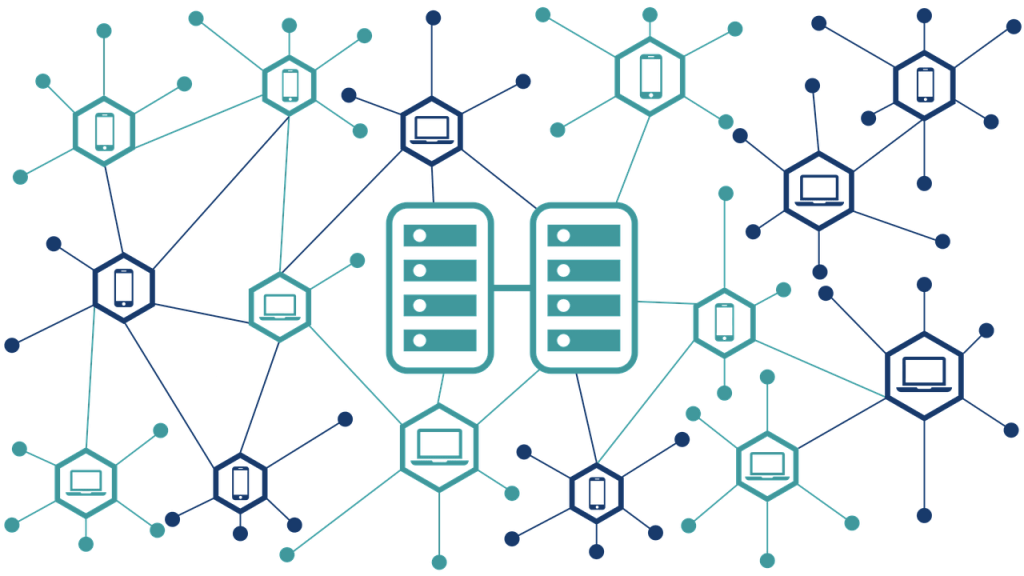Decentralization constitutes the distribution of decision making powers from a single central authority. This is one of the more attractive features of cryptocurrency as it cannot be centrally controlled.
In the peer-to-peer systems used by most cryptocurrency networks, the transactions are validated by a distributed group of network miners, thus, the transfer of value does not need a central authority to get involved.
However, the principle of decentralization which is embodied in cryptocurrency has not yet been fully integrated in the world of cryptocurrency exchanges. A majority of crypto trades occur on centralized exchanges, instead of happening on decentralized exchanges.
Centralized Exchanges
Centralized exchanges are platform run by companies that act as intermediaries that facilitate and mediate the trading process. In exchange for supplying this service, they charge trading fees. Centralized exchanges serve as a gateway for newcomers which are looking to enter the world of crypto trading. This is because many individuals look for an interface that offer connection to both cryptocurrency trading and traditional economy, which centralized exchanges provide.
Since their emergence, this type of exchanges gave cryptocurrencies like Bitcoin, Ethereum etc more exposure to a broader audience, providing the momentum and liquidity needed to make crypto markets noticed by the masses.
But they also present a number of disadvantages and have faced a lot of criticism from the community with regards to several issues, which were:
Hacks and stolen funds: In the past 9 years, over 30 cryptocurrency exchange hacks occurred in which funds were stolen, some of the most notable incidents being Mt.Gox, BitGrail, Coincheck etc. And the number of attempts keeps on growing as hackers are still looking for ways of exploiting vulnerabilities in their systems.
Government ban: Not all governments are welcoming to cryptocurrencies, with a number of them enforcing harsh regulation for trading, mining and other crypto-relate activities. The most high-profile bans and crackdowns happened in China, Korea, and Russia.
Lack of a good support system: Many central exchange users have complained of slow response times and often, their issues took weeks to be solved. This is detrimental in a market that is by nature highly volatile and time is of the essence.
When purchasing cryptocurrencies on centralized exchanges, you don’t actually own them as the exchanges don’t give you the private keys of your funds. Instead, the appropriate crypto number is credited by them against your order.
Also, there is the matter of KYC compliance and identity document submission which are required to be performed when using such centralized services. This exposes you to another vulnerability, that of identity theft or leakage of personal identity information via centralized exchanges.
The market’s most popular centralized exchanges do not list most of the ICOs or token sales because of the stringent regulations enforced by the US SEC and the rest of the governments. High-profile exchanges can go on for months without listing any ICO token which can result in liquidity issues for good ICOs or token sales.
Examples of centralized exchanges include: Bittrex, Bitfinex, Coinbase, Kraken, Binance, BitMex, OKEx, Huobi, Poloniex, etc.
Decentralized Exchanges
Decentralized exchanges eliminate the need for third party to serve as an intermediate for their operation. Instead of matching buy and sell orders in an order book, a decentralized exchange directly match the people that placed those buy and sell orders.
The system on which decentralized exchanges are based pose significant advantages to those using them. As there is no intermediary, this results in very low trading fees as there are barely any company expenses.
Decentralized exchanges also offer more privacy, as they do require personal information and proof of identity to allow users to trade on their platform. Any disclosure of identity is required to the individual that you are conducting the trade with.
Security is also more enhanced on decentralized exchange platforms, as they do not hold cryptocurrency for users, instead connecting the trading parties directly with each other. This means that there are no servers can be hacked and have the private keys stolen as they do not exist.
But in spite of its many attractive advantages, decentralized exchanges are not as popular as their centralized peers. This can make complicate the trading process on existing decentralized platforms. The smaller number of clients on decentralized exchanges leads to much lower trading volumes in comparison to centralized ones.
This means that finding an adequate trade can be a problem. This also affects liquidity, as having lower trading volume make it difficult for those trying to sell cryptocurrency and liquidate into cash. Decentralized exchanges are also plagued by longer trade times, traders having to wait for cryptocurrency and fiat transactions to complete before finalizing a trade.
Thus, traders which need fast trade times to profit off of market movements will encounter difficulties in achieving this on a decentralized exchange. Lastly, decentralized exchanges currently lack advanced trading operations such as margin trading and stop losses, making it less convenient for professional traders to use the decentralized platform.
Decentralized exchanges can list any ICO or token because they do not have to comply to government regulation as there is no single point of failure in their model.
Examples of decentralized exchanges and protocols include: Cryptobridge, EtherDelta, Bisq, 0x, OasisDex, Kyber Network, Bancor Protocol, WavesDex, OmegaOne, Altcoin.io, BarterDex etc.
Conclusion
The principle of which blockchain and cryptocurrency were based was one of decentralization. However, this same concept has not extended to the trading practices which occur in this space.
Decentralized exchanges continue to be obscured because of their centralized peers, which currently offer better trading options and liquidity.
Featured image: 8bitmen
